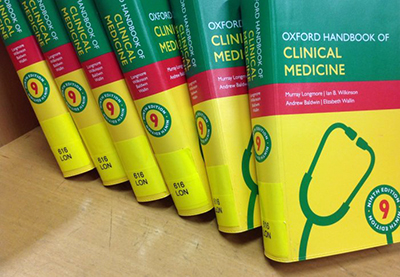
Source: www3.imperial.ac.uk
Adaptation is difficult, be it a change of medical school, an entrance to a new academic session or even as simple as starting your clinical years. As an Egypt transfer student currently doing my clinical training in Malaysia, I have realised that the training here is proving to be a challenge. The system here is very much hands on and is specifically tailored towards catering to the Malaysian Clinical Practice Guidelines (CPG).
Stephen Hawking once said, “Intelligence is the ability to adapt to change”. Adaptation and transitioning to a new system has not been a walk in the park for me but I would like to think that I have managed to adapt well (hopefully). Here, I have decided to compile some tips to help those in any sort of transition into the clinical years, be it in Malaysia or even other medical schools abroad.
Always be ON TIME
Punctuality is the key and you would not want to miss out on the introduction of any session which will give you a brief overview of what you will be doing later on.
Get enough SLEEP
The brain functions best when you get sufficient sleep. Sleep deprivation is not something a student should experience as it impairs your ability to focus and stay alert. So keep the candy crush marathons away from yourselves at night and hit the sack on time.
READ up on your PATIENTS
Remember to read up on your patients’ charts, review the suggested treatment and think about why that particular course of treatment is chosen instead of the other. Remember the course or progression of their illnesses and have a brief idea on the progress and wellbeing of most if not all the patients in the ward.
Never do NOTHING, Volunteer
Never be idle during ward work, continue clerking patients and assisting doctors with procedures whenever the opportunity arises. You actually learn more by doing than just observing. Remember, in medicine, it’s always the “See One, Do One, Teach One Rule”
Be a TEAM player
It may seem cool to be the lone ranger or the solo hero but working with others will definitely help polish and develop both your teaching and learning skills. Teach and learn from others to maximise advantages.
Learn how to SPEAK TO OTHERS
One of my lecturers once told me that a good doctor knows how to speak to four types of people; Patients, Peers, Public and Powers at be. Always be nice and keep smiling to cheer up those around you.
Build your STUDY METHOD
As variations exist in anatomy, study methods also exist in variation and may differ from one another. It is important to learn the best skills and methods for yourself and to follow your style. Keep a schedule, commit to it and work towards improving yourself. Don’t expect to be “spoon fed” as the more you strive to learn yourself, the better you get. The more information and knowledge you acquire, the better you will be.
Study DAILY IN A GROUP
Being a good student requires developing good study habits. As cliché as this may sound, it is a very important point to hold onto especially if you’re a medical student. There is a huge volume of materials being presented to you, and it is very easy to fall behind if you do not keep up with the pace. Even if you cannot study every single day, try to browse through your books or notes whenever you can. A little is better than nothing at all.
Overview the chapter or subject
Start with the big picture in mind. Sift through the assigned chapter or unit in the beginning of your studies and get a rough idea of what you will be covering. While you are skimming through, decide and focus on the aspects that need thorough understanding as opposed to minor details that can be learned or understood at a later time or closer to the exam date. Basically, learn to prioritise. Take your time and think through the steps of the major concepts when you have extra time. More than likely, the mundane facts will only reside in your short-term memory and will only frustrate you if you first attempt to memorize words and diseases you do not understand.
ENJOY what you are doing
If you find yourself getting bored while you study, stop. Take a break, and think of a way to make what you are studying more interesting, whether by turning it into a game, making it interactive, more visual, or even reading interesting case reports online of a related disease. Sometimes, pegging the knowledge onto a case report or vignette can make the information ‘stick’ to your mind, which at the end of the day, is all that matters.
In summary, adaptation need not be a tortuous task. Though it may seem difficult initially, provided that you put in the effort, slowly but surely, you will definitely make it.
As human beings we do change, grow, adapt, perhaps even learn and become wiser.
– Wendy Carlos
This article is written by Izzuddin Azaharuddin, a 4th year student at Cyberjaya University College of Medical Sciences. Learn more about the Young Columnists the main menu.
